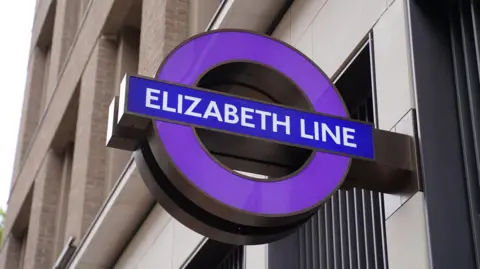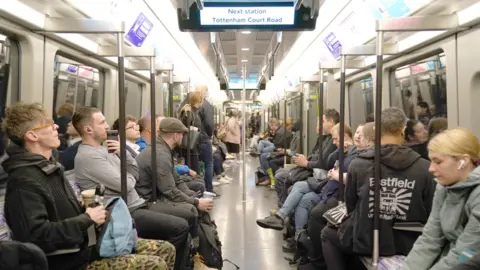Rise in jobs and homes near Elizabeth line - TfL
 PA Media
PA MediaThe Elizabeth line has bolstered jobs and housebuilding for London, according to analysis from Transport for London (TfL).
According to TfL's evaluation study interim findings, there has been an increase in housing growth within one kilometre (0.6 miles) of an Elizabeth line station between 2017 and 2022.
About 378,000 additional jobs were created between 2015 and 2022, TfL added.
The £18.9 billion infrastructure project has broadly been a success, albeit reliability and overcrowding in the west can still be an issue.
The line, which connects Reading and Heathrow Airport with Shenfield and Abbey Wood via central London, opened late and over budget.
Since then, more than 500 million passenger journeys have been made.
 PA Media
PA MediaAccording to TfL's analysis, Abbey Wood has seen some of the biggest growth, with a 6% increase in new homes and 11% increase in access to employment.
Christofi Christou, president of the South East London Chamber of Commerce, said the Elizabeth line was having a "very positive impact" on businesses while Kay Buxton, chief executive of The Paddington Partnership, said the line had been a "post-Covid shot-in-the-arm" for the area.
"Paddington saw a 150% increase in office deals," she said.
"Two-and-a half years later, Paddington is the UK's second busiest station and demand for office space and confidence in the location continues to grow."
But heading out of Paddington, the infrastructure - which is owned and maintained by Network Rail - is heavily used and can sometimes struggle.
There have been delayed engineering works, a track defect, and cancellations, with the line's reliability previously criticised by the mayor of London.
But TfL wants everyone to know the wider financial benefits from the Elizabeth line.
These assessments are done for a reason and will help when TfL makes the case to government for more capital spending for projects like Crossrail 2, the Bakerloo line and DLR line extensions.
Listen to the best of BBC Radio London on Sounds and follow BBC London on Facebook, X and Instagram. Send your story ideas to [email protected]
